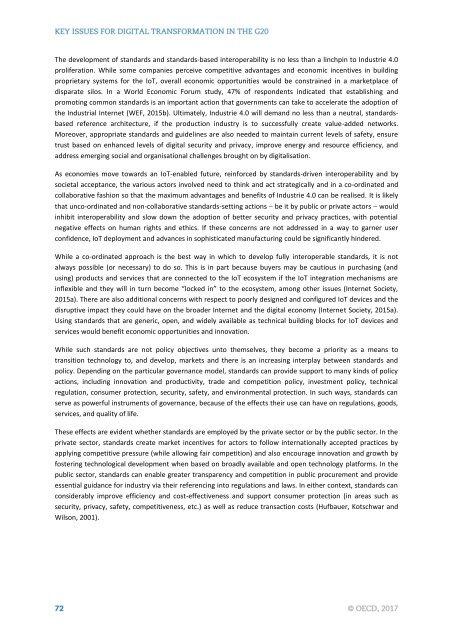KEY ISSUES FOR DIGITAL TRANSFORMATION IN THE G20
2jz0oUm
2jz0oUm
Create successful ePaper yourself
Turn your PDF publications into a flip-book with our unique Google optimized e-Paper software.
The development of standards and standards-based interoperability is no less than a linchpin to Industrie 4.0<br />
proliferation. While some companies perceive competitive advantages and economic incentives in building<br />
proprietary systems for the IoT, overall economic opportunities would be constrained in a marketplace of<br />
disparate silos. In a World Economic Forum study, 47% of respondents indicated that establishing and<br />
promoting common standards is an important action that governments can take to accelerate the adoption of<br />
the Industrial Internet (WEF, 2015b). Ultimately, Industrie 4.0 will demand no less than a neutral, standardsbased<br />
reference architecture, if the production industry is to successfully create value-added networks.<br />
Moreover, appropriate standards and guidelines are also needed to maintain current levels of safety, ensure<br />
trust based on enhanced levels of digital security and privacy, improve energy and resource efficiency, and<br />
address emerging social and organisational challenges brought on by digitalisation.<br />
As economies move towards an IoT-enabled future, reinforced by standards-driven interoperability and by<br />
societal acceptance, the various actors involved need to think and act strategically and in a co-ordinated and<br />
collaborative fashion so that the maximum advantages and benefits of Industrie 4.0 can be realised. It is likely<br />
that unco-ordinated and non-collaborative standards-setting actions be it by public or private actors would<br />
inhibit interoperability and slow down the adoption of better security and privacy practices, with potential<br />
negative effects on human rights and ethics. If these concerns are not addressed in a way to garner user<br />
confidence, IoT deployment and advances in sophisticated manufacturing could be significantly hindered.<br />
While a co-ordinated approach is the best way in which to develop fully interoperable standards, it is not<br />
always possible (or necessary) to do so. This is in part because buyers may be cautious in purchasing (and<br />
using) products and services that are connected to the IoT ecosystem if the IoT integration mechanisms are<br />
inflexible and they will in turn become “locked in” to the ecosystem, among other issues (Internet Society,<br />
2015a). There are also additional concerns with respect to poorly designed and configured IoT devices and the<br />
disruptive impact they could have on the broader Internet and the digital economy (Internet Society, 2015a).<br />
Using standards that are generic, open, and widely available as technical building blocks for IoT devices and<br />
services would benefit economic opportunities and innovation.<br />
While such standards are not policy objectives unto themselves, they become a priority as a means to<br />
transition technology to, and develop, markets and there is an increasing interplay between standards and<br />
policy. Depending on the particular governance model, standards can provide support to many kinds of policy<br />
actions, including innovation and productivity, trade and competition policy, investment policy, technical<br />
regulation, consumer protection, security, safety, and environmental protection. In such ways, standards can<br />
serve as powerful instruments of governance, because of the effects their use can have on regulations, goods,<br />
services, and quality of life.<br />
These effects are evident whether standards are employed by the private sector or by the public sector. In the<br />
private sector, standards create market incentives for actors to follow internationally accepted practices by<br />
applying competitive pressure (while allowing fair competition) and also encourage innovation and growth by<br />
fostering technological development when based on broadly available and open technology platforms. In the<br />
public sector, standards can enable greater transparency and competition in public procurement and provide<br />
essential guidance for industry via their referencing into regulations and laws. In either context, standards can<br />
considerably improve efficiency and cost-effectiveness and support consumer protection (in areas such as<br />
security, privacy, safety, competitiveness, etc.) as well as reduce transaction costs (Hufbauer, Kotschwar and<br />
Wilson, 2001).


